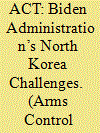| Srl | Item |
| 1 |
ID:
180438


|
|
|
|
|
| Summary/Abstract |
In 1985, North Korea acceded to the nuclear Nonproliferation Treaty, which, in theory, meant it had forsaken nuclear weapons. In January 1992, it signed the Joint Declaration on the Denuclearization of the Korean Peninsula with South Korea, thus committing both countries not to “test, manufacture, produce, receive, possess, store, deploy or use nuclear weapons” or to “possess nuclear reprocessing and uranium enrichment facilities.” By the end of that year, however, there were growing concerns about Pyongyang’s ambitions that in time proved all too real and spurred a decades-long push for increasingly stricter sanctions and some kind of negotiated solution.
|
|
|
|
|
|
|
|
|
|
|
|
|
|
|
|
| 2 |
ID:
162104


|
|
|
| 3 |
ID:
180442


|
|
|
|
|
| Summary/Abstract |
In May 2021, the Biden administration announced its intention to pursue a “calibrated, practical approach that is open to and will explore diplomacy” with North Korea. The intention was to distance its approach from those of President Joe Biden’s two immediate predecessors. As White House spokesperson Jen Psaki emphasized, “[O]ur policy will not focus on achieving a grand bargain, nor will it rely on strategic patience.”
|
|
|
|
|
|
|
|
|
|
|
|
|
|
|
|
| 4 |
ID:
190341


|
|
|
| 5 |
ID:
173029


|
|
|
|
|
| Summary/Abstract |
Seventy-five years ago, the United States tested the first nuclear weapon in New Mexico and then used one to destroy Hiroshima and another to destroy Nagasaki. As devastating as they were, those atomic bombs were small by today’s standards, each exploding with just a tenth of the explosive yield of typical warheads now deployed on missiles, submarines, and planes by a handful of countries. Fortunately, no nuclear weapons have been used in combat since the bombings in Japan, but the risk of nuclear war ebbed and flowed throughout the Cold War. It has been increasing in the past three years. The United States and Russia have abandoned long-standing nuclear arms control treaties, started to develop new kinds of nuclear weapons, and expanded the circumstances in which they might use nuclear weapons. However a nuclear exchange might start, it could quickly escalate from a local disaster into a global catastrophe.
|
|
|
|
|
|
|
|
|
|
|
|
|
|
|
|